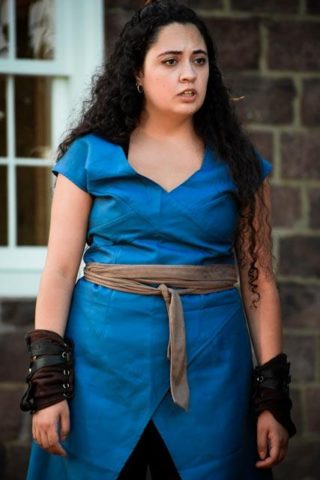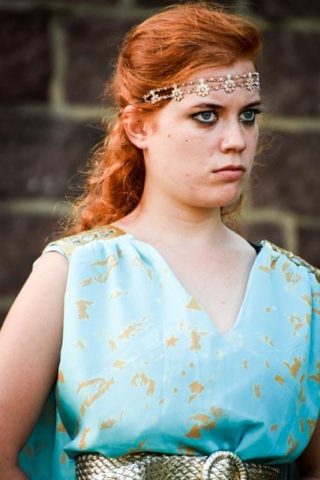The Hudson Shakespeare Company returns with its second and final installment of its 28th summer Shakespeare touring
season with a unique spin on the little done play – Coriolanus. The production is touring to the following libraries and
parks throughout northern New Jersey:

Abby Albrecht (Coriolanus) 
Alexander Taylor (Aufidius) 
Maggie Schweppe (Volumnia) 
Amanda Cook (Menenius) 
Norah Hogan (Virgilla) 
Ziggy Schulting (Cominius) 
Emmy Kuperschmid (Titus/Lartius/Marcius 
Klara Gribetz (Brutus) 
Mia Christinis (Scinius)
Thursday July 18th @ 7pm
Kenndy Blvd. between Hutton Street and Manhattan Avenue
Leonard Gordon Park, Jersey City, NJ
Friday July 19th @ 7pm
Weasel Brook Park, Vanderhoef House,
1 Westervelt Pl. Clifton, NJ
(Rain location inside Vanderhoef House)
Tuesday July 23rd @ 7:30pm
Monument Park
Palisade Ave &, Angioletti Pl, Fort Lee, NJ
(Rain Location – Fort Lee Library, 320 Main Street, Fort Lee)
Wednesday July 24th @ 7:30pm
Atlantic Street Park
102 State Street, Hackensack, NJ
(Rain Location – HACPAC center next to park)
Thursday July 25th @ 7pm
Hamilton Park
9th Street and Jersey Avenue, Jersey City, NJ
(Rain Location – Under park gazebo)
Tuesday July 30th @ 7:30pm
Monument Park
Palisade Ave &, Angioletti Pl, Fort Lee, NJ
(Rain Location – Fort Lee Library, 320 Main Street, Fort Lee)
All of the above shows are free to the public. The company will also be participating in a special fund raiser performance
at:
Historic Jersey City and Harsimus Cemetery
Thursday August 1st @ 7pm
435 Newark Ave, Jersey City, NJ 07302
(Tickets for this event are $10 suggested donation. All proceeds go towards preserving this historic site run by veteran
volunteers of the US Armed Forces)
Patrons are encouraged to bring lawn chairs and blankets for any outdoor shows as available seating is limited.
The Play
Shakespeare’s exploration of military honor, corrupt politics and complicated family relations are shifted from a traditional
Roman setting to an ancient, fantasy world with an all-female cast. Based on the semi-legendary, semi-historical figure of
Caius Marcius Coriolanus, this is not yet the Rome of Julius Caesar but tells a hard bitten tale of centuries before the
classical republic and eventual empire. A country still working itself out. Director Noelle Fair showcases an Amazonian
world taking many influences from both historical (women warrior societyie of ancient Eastern Europe) and fantasy
sources (Wonder Woman, Game of Thrones), underscoring it with a percussive and female driven soundtrack.
Maricus (Abby Albrecht) is a career soldier fiercely driven by duty to her country, her wife Virgilia (Norah Hogan) and
family but has a vast contempt for the common people. The Plebeians, in her view, are beneath her as they won’t defend
and shed blood for their country, but they bask in the security she and the other soldiers provide. Word soon comes that
Aufidius (Alexandra Taylor), a general in the hostile, neighboring city-state of Volsce and Marcius’ long-time enemy, is
mounting a military campaign. Marcius, along with her fellow generals Cominius (Ziggy Schulting) and Titus (Emmy
Kuperschmid), meet the threat in the Volsce city of Corioli. At Corioli, the Romans are overrun until Marcius single-
handedly breaks through the enemy’s forces and humiliates Aufidius in one-on-one combat.
The troops return triumphantly to Rome and having won a decisive victory in Corioli, Marcius is granted the honorary
name of Coriolanus to commemorate the victory. However, what Marcius sees as her simple duty, her mother Volumnia
(Maggie Schweppe) and her mentor Menenius (Amanda Cook) see as an opportunity for political advancement. The office
of Consul, similar to the Secretary of Defense, is up for election but Marcius must get the vote of the very people who
she hates and who hate her. Complicating matters, the city’s Plebian representatives, the cunning Tribune Sicinius (Mia
Christinis) and the blunt Tribune Brutus (Klara Gribetz) openly plot to thwart Marcius’ nomination.
Receiving pressure from her overbearing mother and allies, Marcius reluctantly seeks the office and is elected. Sicinius
and Brutus later sow discontent amongst the same populace with news of Marcius’ true feelings about them leading to a
riot and her eventual banishment. However, the political victory of Sicinius and Brutus is short-lived as Marcius goes to
the home of her enemy Aufidius and raises an army to destroy Rome. Will they succeed in their military invasion or will
more subtle and familiar forces stop the vengeful Coriolanus?
Written in 1606, “Coriolanus†marks the end of Shakespeare’s high tragedies of “Macbeth†and “King Lear†before moving
on to more hopeful redemption stories of “Pericles†and “The Winter’s Taleâ€.
Hudson Shakespeare Company was begun in 1992 and for 28 seasons has toured free Shakespeare to parks and libraries
in northern New Jersey presenting the Bard’s well known and lesser done titles in a variety of settings and periods. For
more information, visit, www.hudsonshakespeare.co
Noelle Fair (Director) Originally from Baltimore, Maryland. She attended Towson University as an undergrad where she got a bachelor’s in Theater Arts. She then attended the University of Exeter in England where she received her MFA in Staging Shakespeare. There she studied with Shakespeare’s Globe Theatre in London as well as members of the Royal Shakespeare Company such as the late Cicely Berry and John Barton. Â
Abby Albrecht (Coriolanus) Originally from Chicago, IL. She attended Northwestern University (BA Theater Arts) and holds a Masters from the London Academy of Music and Dramatic Art (LAMDA). Abby’s take on Coriolanus: “ I play Coriolanus— the accomplished war hero of Rome with a famous temper and disdain for the common people. Playing Coriolanus is a gift as a female actor, because I don’t have to think twice about taking up space and speaking my mind. It’s incredibly empowering as both an actor and a woman. I also enjoy playing a flawed protagonist— it means I get to delve into darker parts of myself while at the same time letting the sincerity of the character seep through in monumental moments. Basically, despite the extremity of the plot, I get to play a real human being. Thanks Shakespeare!â€
Alexandra Taylor (Aufidius) Originally from Charlotte, North Caroline. She attended Barnard College (BA in Theater Arts). Alex’s take on Aufidius: “Aufidius is strong, commanding, and yet also consumed by an obsession with Coriolanus. Playing Aufidius as a woman, I think, makes the emotional journey of what it means to love, loathe, and want to be someone all in the same moment richer and more fully fleshed.â€
Maggie Schweppe (Volumnia) Originally from Philadelphia, PA. She holds a BFA in Acting from PACE University and has also attended LAMBDA. Maggie’s take on Volumnia: “I play Volumnia, the mother of Coriolanus. She values honor over everything else and takes great pride in her child’s success. She is integral to the story because she is the only person who can always get through to Coriolanus. At the end of the play, she saves Rome. She’s a hero.
In regards to our production, this role was originally written for a woman, so there was no need to switch gender. It’s fascinating because in this play Shakespeare created a man’s world with few women. However, it is one of the few who changes everything. Although Shakespeare wrote significantly less roles for women, they, for the most part, are incredibly complex, cunning, and powerful.â€
Amanda Cook (Menenius) Originally from Chicago, IL. Amanda attended the University of Southern California where she received a BA Theater. As part of this program she also attended the British American Drama Academy. Amanda’s take on Menenius: “
Menenius is the humorous patrician which, I believe, she actually uses as a political tactic. “ Director’s addition to this character description: Menenius is a high ranking patrician and friend to both the citizens of Rome and Coriolanus. She is constantly trying to keep the peace between the two, and constantly attempts to be the voice of reason. However, this seems to fall on deaf ears as Coriolanus loses her temper at the people and the people dispise Coriolanus for her current and past wrongs against them. Within a traditional staging of the play, Menenius almost becomes a parental figure to Coriolanus (sort of acting as “Dad†and Volumnia as “Momâ€) but in this instance Menenius sort of became “the fun parentâ€, and thus the domestic scenes become extremely light, funny, and comedic when three women and a child (Virgilia, Volumnia, Menenius,and Marciius’ young daughter) are chatting, knitting, and gossiping about the latest news and their love for Coriolanus. This made a lot of the interaction in scenes with the other scripted women come across more as “girl talk†(super chatty, excitable, light, fun, playful) rather than diplomatic.
Norah Hogan (Virgilia) is originally from Massachusetts. She attended NYU Tish School of the Arts (BA: Theater). Norah’s take: “Virgilia has been such an interesting role to explore. She has very little text and she’s referred to as “sweet silence†and “gracious silence†by Coriolanus at various points in the play. I’m personally someone whose primary means of expression is always verbal so it’s a delightful challenge to find means of expressing her opinions and vast emotional life in her silences. I think she is very strong, much stronger than an initial read of the text might suggest.†Director’s addition to this: “The thing that I found interesting about Virgilia is her vulnerability – and how that vulnerability becomes a strength for her. In the end, it is Virgilia’s vulnerability and sensitivity which gets through the tough outer shell of Coriolanus in order to aid in the saving of Rome from imminent destruction.â€
Ziggy Schulting (Cominius) Is originally from Farmington, CT. She attended Skidmore College where she worked with the SITI Company. Ziggy’s take on Cominius: “Cominius is sort of the moral compass of the play. She’s a caretaker, and she’s taking care of everyone–exchanging glances with Volumnia, watching out for what night slip out of Menenius’ mouth, minding Titus Lartius in the field, and above all, she deeply cares about her friendship with Marcius. She’s a direct foil of Coriolanus in that way, who often acts impulsively and selfishly, Cominius is quiet for a great deal of the play, but she’s there for every big moment, listening. Because I’m a woman playing this traditionally male role as a woman, I think the audience is able to see her as more than a powerful war general, which she still obviously is, but more importantly, they’re able to see her maternal side and how deeply she feels for the people in her life. While she doesn’t always say it, she feels the impact of everyone else’s moves, and hopefully that comes across.â€
Â
Emmy Kuperschmid (Titus Lartius/Young Marcius) Emmy is originally from Canton, MA and also attended Skidmore College (BA: Theater) Emmy’s take on Titus: “These are all traditionally male characters, and it’s been great not only to get to play these roles, but play them as women (as opposed to being a woman playing a man). Especially for Titus Lartius, the war general—it’s been so exciting to explore her place in this world and find a version of strength that is not necessarily rooted in masculinity.â€
Klara Gribetz (Brutus) Klara is originally from White Plains, NY and attended Hofstra University where she holds a BFA in Theater Arts. Klara’s take on Brutus: “I play the role of Brutus. Klara views the conniving Tribune Brutus as a hot head who is trying her best to stay temporized and poised for the people, in order for them to trust her as their leader.â€
Mia Christinis (Scinius) originally from London, UK. She attended American Academy of Dramatic Art two year Conservatory program and is a member of British Equity. Mia’s take on Scinius: “I play the role of Sicinius, who is in charge of voicing the people’s opinions to the patricians and generals. However, she uses her power to manipulate the people and to seek her own motives, with the help of Brutus. Sicinius is an incredibly interesting character because she falls between being a mind player and also fighting for what she truly believes is right. Being a woman playing Sicinius allows me to tap into the more conscious part of her. She’s more of a planner, she thinks things through and uses her words very carefully.â€
